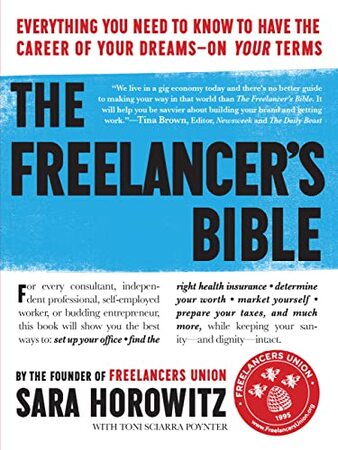Table of Contents
Want to begin freelancing but need help figuring out where to start? The universe of freedom and prospective employment prospects is unlocked by freelancing. But figuring out where to start and how to succeed might be challenging. The good news is that many tools are available to support you as you embark on a freelance career. Today, along with some useful resources, we’re presenting 10 freelancing tips to get you started as a freelancer.
10 tips before you start freelancing today
It may not seem very safe to begin freelancing. Where do you start when there are so many things to consider? Start freelancing now by taking into account these freelancing tips.
1. Explore Skills in High Demand
Identifying in-demand abilities that you currently possess can assist you in developing a well-liked service bundle. Find a talent that is in demand and never goes out of style. Writing, drawing, computing, or managing social media are a few examples of this.
Advice: For ideas, browse freelance marketplaces like Upwork and Fiverr. You can discover which talents are in demand and how freelancers sell themselves by, for instance, browsing Fiverr’s WordPress developers.
Next, consider how you may package this talent as a service that aids customers in achieving their objectives and resolving their issues.
Here are a few ideas:
- Managing the company’s Facebook and LinkedIn pages
- Writing ebooks
- Illustrating graphics for a company website
- Developing WordPress sites
- Bookkeeping for small business accounts
2. Specify and Outline Your Services
This is one of the most important freelancing tips if you want to be successful. Learn how to offer your abilities as a service.
Understanding your client’s circumstances and how your services can help them is crucial for freelancing success. Consider how you bundle your services to handle their issues effectively.
The next step is to develop a succinct description of your services and how they address problems. Consider what you do, how you do it, and the kind of people and companies you serve.
Here is an example of how independent copywriter Tom Rigby explains all the many services he provides:
3. Improve your skill set
Being a successful freelancer requires never ceasing to study. Even if you believe you have mastered your offering, you still need to continue developing your knowledge base.
Always schedule time each week for learning and personal growth. You may expand your service offerings and enhance your present ones in this manner.
Depending on the talents you wish to develop, think about enrolling in classes on websites like:
You can maintain your competitiveness over time and establish yourself as the go-to freelancer in your area by consistently investing in your education.
4. Build Relationships with Your target Clients
Determine the perfect customer for your service before you begin freelancing. Consider if they share a problem or possess comparable traits. Do they belong to the same industrial sector? Maybe you’re aiming for a larger pool of prospective customers?
Regardless of who your ideal client is, you’ll need to present yourself to prospective customers so they are aware of the services you provide and the job you do. You may be able to depend on customer recommendations or individuals discovering you naturally as you develop and establish a reputation. But first, you’ll need to be aggressive in seeking out possible customers and chances for freelance employment.
You may expose yourself to potential customers by:
- Tapping into your existing professional network on LinkedIn
- Marketing yourself on social media and your website
- Using freelance platforms like Fiverr or Upwork
- Responding to freelance job postings
- Participating in freelance community groups on Facebook and Slack
See which of these approaches best positions you and your product in front of customers.
5. Showcase Your Work Online
To demonstrate your knowledge and competence to potential customers, an online portfolio is essential. By presenting your previous projects, your portfolio proves the quality of your work. This is your time to demonstrate to customers your abilities and worth as a freelancer.
Include your finest work in your portfolio, showcasing your abilities in each item. Make an effort to show how your efforts helped the customer.
Consider including things like:
- Testimonials
- Case studies
- Samples of work
- Data-driven results
- Mock-ups
Before using prior clients’ work, outcomes, or testimonials, always get their consent.
Here is an example of a colourful and user-friendly web designer’s portfolio. An overview of all the most recent projects they worked on may be seen on the main page. Then, users may browse through each project to learn about its specifics.
6. begin freelancing part-time
This is also one of the most important freelancing tips for beginners. It’s a good idea to freelance part-time as a side job before you jump the gun and leave your 9 to 5. This presents you with the ideal chance to evaluate your service offering, ascertain the precise needs of your target customers, and launch your company’s marketing campaign.
You’ll start to get a sense of what freelancing is like and if it matches your skill set after you start performing these things consistently. You won’t be under the burden of having to rely on a freelancer’s income, which will allow you to gradually improve your offering.
7. Grow Your Personal brand
This is one of the freelancing tips that may not seem crucial at the start. However, you may differentiate yourself from other freelancers and establish stronger connections with customers by developing your unique brand. Having a strong personal brand may mean that you receive more organic enquiries as you demonstrate your knowledge on numerous platforms rather than having to sell individuals you want to collaborate with.
You may create your own personal brand online in the following places:
- Industry-specific sites like Behance for graphics designers or illustrators
Maintain as much consistency as you can. A fantastic objective to have is a few interactions each day coupled with a daily post.
A wonderful long-term technique that can help you develop connections and grow your leads over time is creating a personal brand. You’ll have a solid foundation for the future if you cultivate it from the start.
Kat Boogard, a freelance writer, has a powerful personal brand. She often maintains her personal blog, social media, and runs an online store where she offers a variety of goods made to benefit freelancers.
8. Establish your reputation
You may get future freelance jobs and guarantee that you are a sought-after freelancer in your specialty by developing a strong reputation for yourself.
Keeping good customer connections is the first step in developing your reputation. It’s critical to see your customers as people rather than as one-off jobs.
Put your attention into developing a rapport with your clientele and producing high-caliber work. In addition to feeling fantastic about your work, you’ll increase your chances of getting repeat business and customer recommendations that lead to further work.
How can you build good client relationships?
Create consistently high-quality work: For clients to be satisfied, high-quality work is crucial. To establish a long-lasting connection, you must address the client’s issue and provide value.
Look for opportunities to provide extra value:
By going above and above with your job, try to surprise and please your customer. You’ll increase happiness and make it easier to find alternative methods to work together if you take the initiative and demonstrate your capacity for additional duties.
Effective communication
Stronger business connections are fostered by effective client communication, which also increases your clients’ faith in you.
controlling expectations
Although it might be tempting to overpromise, it is far preferable to underpromise and exceed expectations. Meet your deadlines and go above what you first committed to. Your customer will be satisfied when you overdeliver since they will trust your method.
9. Determine Your Freelancing rates
Setting your freelancing fees requires a careful balancing act between being paid as much as possible, staying competitive, and retaining employment. Start by examining the rates that your rivals are charging for comparable freelance services.
Setting freelance prices is an art, not a science; you’ll probably discover that your charges change based on the client’s budget, the industry vertical, and your level of expertise. Take the following into account while determining rates:
- Industry: How much market demand is there from your chosen industry?
- Experience: The experience you have will likely impact the value you’re able to deliver.
- Project complexity: Longer more complex projects need to be compensated for accordingly.
- Client’s location: Geographical location and local currency may impact the client’s budget.
- Urgency: Freelancers often charge more for rush projects.
- Project duration: One off projects may incur higher costs than steady long-term contracts.
Your charges for each job may be determined with the use of these factors. Keep in mind that your charges are flexible. Regularly review them and tweak them in accordance with your expertise and the demands of the industry.
10. Connect with Freelance Networks
Working alone may be isolating. It might seem lonely when there are no meetings, break rooms, or colleagues. However, the nicest thing about freelancing is that there are lots of people that do it.
A wonderful method to make friends with other freelancers of various skill levels is to join freelancing groups. There will be some new freelancers who can relate to your highs and lows since they are also just starting out. Additionally, you might seek assistance from more seasoned freelancers.
You may expand your freelance network as you get used to these groups. Once you have a solid reputation and people start to take notice of what you do, other freelancers may start sending you work when they are too busy to take on new jobs.
Common Questions on how to Start Freelancing
In addition to our list of freelancing tips we will go through the most frequent questions people ask about freelancing. This will help you have a yet more deeper understading when you start freelancing.
Is prior experience necessary to start freelancing?
Yes, you may begin freelancing without any prior experience. But it’s crucial to choose a freelance option you’re enthusiastic about before beginning to develop a portfolio. Even if you have no prior experience working for yourself, you probably have skills and expertise that may be used to create a service offering. Make a long-term learning commitment and learn as you go.
What are the most suitable skills for freelancing?
No one talent is the best for freelancing. Consider something you are already enthusiastic about and have expertise with instead. Check out how it stacks up against the most in-demand freelancing talents , including web design, writing, editing, and coding. Select a skill that meets both requirements.
What are the common payment options for freelancers?
There are several payment alternatives available to freelancers. Before a project starts, they often work out the terms of the contract payment with the customer. These conditions might state that the freelancer works on a retainer, completes a number of assignments, or simply one project.
Typically, freelancers take payments online using services like PayPal, Wise, or bill.com. Another option for payment from your customer is a straightforward bank transfer. Or you might accept payments made by credit card. The preferences of the customer and the freelancers are everything.
Is it possible to do freelancing on a part-time basis?
The quick answer is yes; in fact, beginning freelancing part-time is often optimal. Many beginning freelancers work a second job in addition to their normal 9 to 5 employment, finishing freelance jobs in the evenings or on the weekends. A wonderful method to test the waters before going all in is to freelance part-time.
What are the top freelancing platforms to consider?
You may wish to utilise certain freelance sites to locate your initial jobs when you first start freelancing in addition to reaching out to your current network. You may start your freelancing company on these platforms, but don’t depend on them too much. Always remember that it is preferable to develop your own network and gradually depend more on it.
To get started here are a few popular freelancing platforms:
The Next Step
A terrific approach to have flexibility, remote work, and a diverse clientele that inspires you is to freelance. By taking into account our list of freelancing tips start off cautiously and progressively. Increase your workload as you gain confidence if you want to succeed. Then, if you’re interested, start working as a freelancer full-time. The secret is to never stop learning and to always aim for excellent work. There is also a complete guide available on Digithru for freelancing.
The mentioned methods help you in starting your freelancing career, however by strategically implementing an effective online marketing approach, you can expand your customer reach, boost service sales, and achieve a favorable return on investment.
It is crucial to cultivate a strong online presence across various internet platforms in order to achieve your business objectives.
Best seller book on the topic
“The Freelancer’s Bible: Everything You Need to Know to Have the Career of Your Dreams” is a comprehensive guide that equips aspiring freelancers with the knowledge and tools necessary to thrive in the freelance industry. In this transformative book, author Sarah Horowitz shares her extensive experience as a successful freelancer, providing invaluable insights and practical advice.





